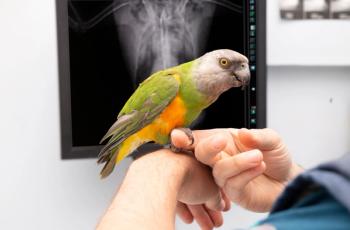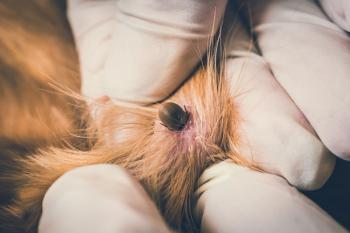
Case study: A new year to keep pets safe from alcohol poisoning
Toxin Tails story spotlighting a dog who got into his owners’ leftover alcohol
In a recent installment of Toxin Tails from Pet Poison Helpline,1 a dog rang in 2023 in a not-so ideal way—by suffering from alcohol toxicity on New Year’s Eve. Below is the case study of this canine.
Case presentation
Red, an 85-95 lb male golden retriever Saint Bernard mix, ingested alcoholic Jell-O shots his owners, Tyler Kronstedt and his fiancée of Andover, Minnesota, had left out by mistake. They returned home from a New Year’s Eve party, with undiagnosed COVID at the time, and placed 15 leftover Jell-O shots they made in a plastic bag. Because they were weary and not feeling great, they forgot to throw the alcohol away before going to sleep.
The pet owners awoke to Red making a lot of ruckus in the middle of the night and found Jell-O shots sprawled across the floor and their dog drunk, staggering upstairs, and walking into walls. The owners called the closest BluePearl Specialty and Emergency Pet Hospital in Duluth, Minnesota, and they recommended to call the toxicology experts at Pet Poison Helpline. In a dvm360® interview, senior toxicologist at Pet Poison Helpline, Renee Schmid, DVM, DABT, DABVT, explained Red’s clinical presentation. “He was really presenting kind of as a drunk person, he was stumbling around, he was staggering, having a difficult time walking and moving and just really kind of lethargic and out of sorts.”
Treatment
The hospital confirmed Red had ingested alcohol and when he arrived, he was hypoglycemic (low blood sugar), which was corrected with intravenous dextrose supplementation. This could be fatal if not treated. He was also given anti-nausea medication. It was recommended to keep Red in the hospital to ensure the hypoglycemia didn’t return plus watch for alcohol poisoning, metabolic acidosis, and neurologic changes; however, the pet parents couldn’t due to financial limitations.
Red’s owner, Kronstedt, stated in the news release,1 “We couldn't afford to keep Red in the hospital for observation, so the BluePearl and Pet Poison Helpline team told us what symptoms to watch for and we took him home. I laid next to him on the floor overnight, waking up every hour to make sure he drank water and tried to eat something."1 Kronstedt was advised that feeding a small amount of food frequently can help reduce the severity of hypoglycemia and prevent it from recurring.
Post-treatment
By the next day, Red was feeling OK again. “He's been doing great. Yeah, it was about a day or so before he was back to his old normal self...The owners were extremely grateful that he improved and that he was able to recover,” remarked Schmid, in the interview.
The danger of alcohol for pets
In the interview, Schmid shared that fortunately, Red was successfully treated in this scenario, however, alcohol can be deadly to pets. “Because of that change in some of their electrolytes and because of the change in their blood glucose, [dogs that have ingested alcohol] can have some respiratory depression. So, if somebody isn't really watching them, and keeping an eye, being astute to any of those potential changes, and treating that as they come along, it can definitely be fatal to them.” She emphasized that all kinds of alcohol are toxic to dogs and the stronger the alcohol, the more of a threat it poses.
Reference
Partying pooch downs 15 Jell-O shots on New Years Eve! Pet Poison Helpline. December 7, 2022. Accessed January 17, 2023. https://www.prnewswire.com/news-releases/partying-pooch-downs-15-jell-o-shots-on-new-years-eve-301696355.html
Newsletter
From exam room tips to practice management insights, get trusted veterinary news delivered straight to your inbox—subscribe to dvm360.




